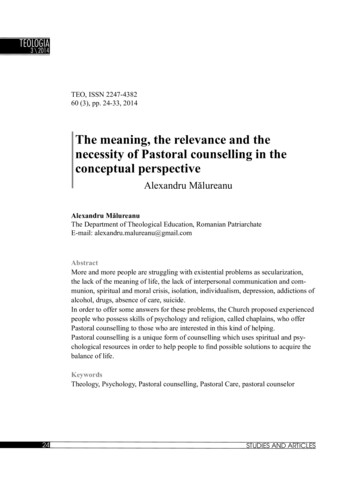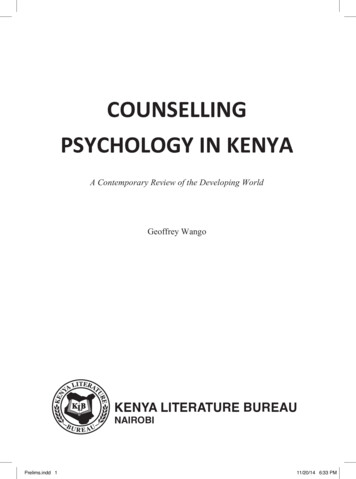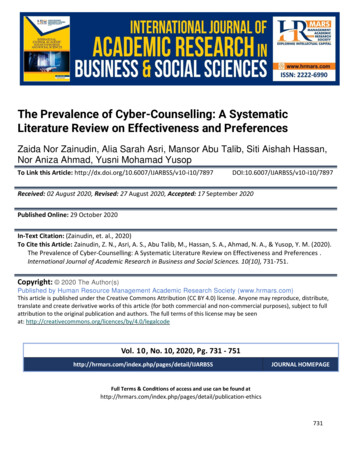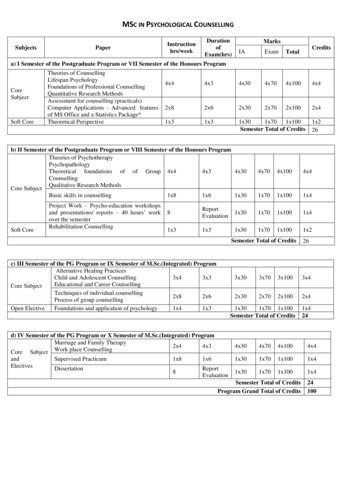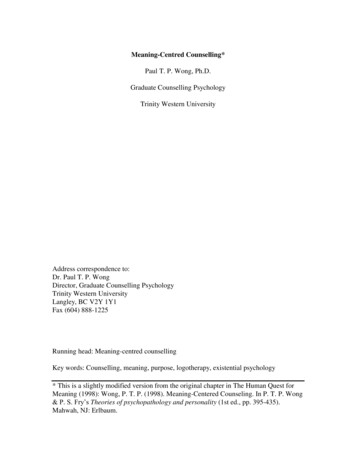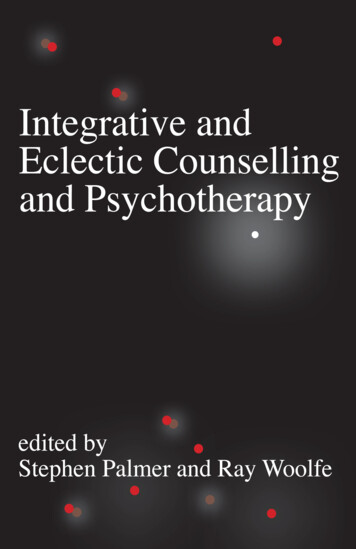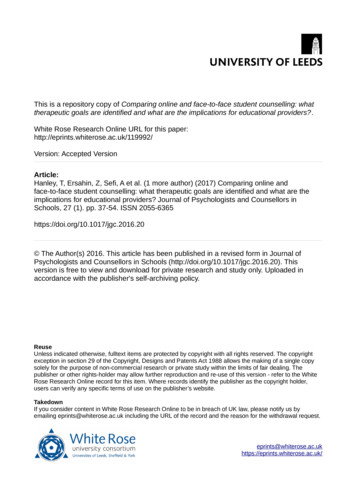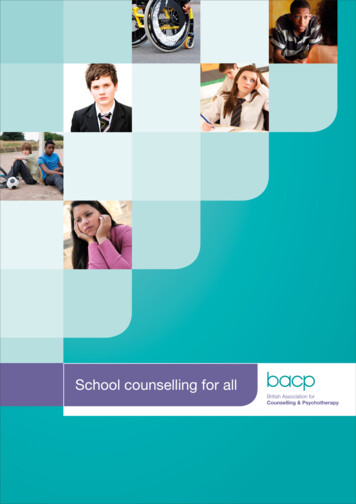
Transcription
School counselling for all
“Britain is falling behind in promotingwellbeing in children”The Children’s Society, UNICEF (2010)School counselling for allNearly 80,000 children and young people in Great Britain areseriously depressed and around three children in every class inthe UK have a diagnosable mental health condition.Experiencing a mental health problem in childhoodis one of the biggest barriers to achieving well-beingand yet only one quarter of children affected aregetting specialist help (Green et al, 2005).Counselling in schools has been shown to bea highly effective support for tens of thousandsof troubled children and young people who areexperiencing emotional health difficulties. The WelshGovernment’s national school-based counsellingstrategy has been shown to be an overwhelmingsuccess, so much so that counselling in Welshsecondary schools is now a statutory service.Despite this, access to school-based counsellingservices in England for many is problematic.While children in Wales and Northern Ireland aresupported by national school-based counsellingprogrammes, funded by their governments,England lags behind. This leaves many distressedyoung people without any access to much neededtherapeutic support in their schools.BACP wants to see parity across the UK, withall children and young people having access tocounselling services within their schools.01School counselling for allWhat is school-basedcounselling?School-based counselling is a professional activity,delivered by qualified practitioners in schools.Counsellors offer troubled and/or distressedchildren and young people an opportunity toexplore and understand their difficulties within arelationship of agreed confidentiality.School-based counselling is one of the mostprevalent forms of psychological therapy for childrenand young people in the UK with between 70,000–90,000 cases seen in UK secondary schoolseach year. However, provision is inconsistent andmany children in England do not have access to acounsellor in their school.The facts: children’s mentalhealth in the UKn20% of children have a mental healthproblem in any given year, and about10% at any one time (Mental HealthFoundation, 2005). That is around threechildren in an average class.nBetween one in 12 and one in15 children and young peopledeliberately self-harm (Mental HealthFoundation, 2006).nMore than half of all adults with mentalhealth problems were diagnosed inchildhood. Less than half were treatedappropriately at the time (Kim-Cohen,Caspi and Moffitt, 2003).nAround three-quarters of children whodevelop a mental illness are unknownto any services (CMO, 2013). BACP 2015
“We want schools to provide more supportto young people who are suffering stress,anxiety and depression, including accessto counselling.”Young Minds (2014)Current provision of school-based counsellingAcross the United Kingdom provision of schoolbased counselling is inconsistent; Wales haslegislated to ensure statutory provision of schoolbased counselling to all Y6 pupils and all 11–18years olds; whilst the Government of NorthernIreland provides ring-fenced funding to ensure allpost primary school children, and those in specialschools, are able to access counselling services.The Department for Education’s (2015) report,Counselling in Schools: a blueprint for the future,sets out an expectation from government that allschools in the future should provide access tocounselling services. It outlines how “counsellingwithin secondary schools has been shown tobring about significant reductions in psychologicaldistress in the short-term, and helps young peoplemove closer towards their personal goals.”In addition, the Department of Health’s (2015)report Future in Mind: Promoting, protectingand improving our children and young people’smental health and wellbeing highlightedcounselling services as “a valuable complementto CAMHS.” The Health Select Committee alsostated that “schools have enormous potential tohelp address emerging mental health issues inchildren and young people” (2014).Despite the recent acknowledgments fromthe Department of Health and Department forEducation about its importance, there has been littlemovement towards a policy of universal provisionfor school counselling, and coverage in Englandremains patchy.The Taskforce on Mental Health in Society (2015) The MentallyHealthy Society: The report of the Taskforce on Mental Health in Societyn“All children should be able to access professional, qualified counselling and therapyservices in their school or college in age-appropriate form”n“School-based provision tends to be well-suited to offering the type of lower-levelintervention that can be hard to access through formal CAMHS, but which canprevent problems subsequently becoming more serious”n“School-based provision is highly accessible, avoiding lengthy or complex referralprocesses, and waits tend to be relatively short. School is also where young peoplealready are during the day, and – crucially – is where they say they want to accessservices: over two-thirds say they would rather see a counsellor at their school asopposed to outside”n“Because schools are a universal service, accessing provision in schools can help toovercome any perceived stigma or reluctance to attend mental health services. Forthese reasons, school-based services such as counselling tend to have high takeup, and there is evidence that young people are more likely to access school-basedmental health services when compared with non-school-based ones.” BACP 2015School counselling for all02
Case study: Jenny’s storyJenny had been a happy, intelligent, high achieving 14 year old. However,when she returned to school after the Christmas break her Form Tutor noticedshe had become quiet and withdrawn – not her usual self.The tutor monitored this for the firstweek of term and then asked Jenny ifeverything was OK. Jenny refused toengage with the tutor, which was unlikeher, and dismissed the issue sayingnothing was the matter. Not knowing ifthis was a phase of adolescence, thetutor decided to keep a watching briefover the following week. In the thirdweek of term, the tutor was approachedby Jenny’s PE teacher who said thatJenny had refused to do PE since thestart of term, and had come up with amyriad of reasons why she shouldn’t.Jenny had also not returned to lunchtimenetball club.Again the tutor tried to address the situationwith Jenny, but she refused to talk or explainher actions. At the end of this somewhatone-sided conversation, the tutor remindedJenny that the school was fortunate to havea school counsellor with a private room inthe Pastoral Block, and that Jenny couldeasily get an appointment if she thoughtthat it might help to talk to someoneindependent. Jenny asked if the meetingwould be confidential, and the tutor assuredJenny that whatever was discussed wouldbe private between her and the counsellor,unless the counsellor felt that someone wasat risk of significant harm.Jenny agreed that she’d like an appointment,and one was made for her the following week.During counselling Jenny talked about thebreakdown of her parents’ marriage overChristmas and the new living arrangements thatshe and her brother were subjected to. She feltbetter having someone she could trust to talkto, and her mood around school began to lift alittle. In the third week of counselling however,Jenny told the counsellor that since Christmas,she had been controlling her eating very carefully.She was skipping lunch at school and makingexcuses not to eat at home. She described howthis helped her cope with her current situation,and also she was worried she was still “toofat”. She didn’t want her teachers or friendsto know about this but began to realise in03School counselling for alltalking with the counsellor that the lack of eatingwasn’t going to help her really.The school counsellor had a very good workingrelationship with the local specialist CAMHSteam and suggested to Jenny that they maybe able to help. With Jenny’s permission, thecounsellor rang her specialist CAMHS contact,and through this communication Jenny agreedthat she would like some expert support for hereating issues. She also thought that having thecounsellor talk to her Mum about the possiblereferral would be easier than raising it herself.Four months later.Jenny is now “back on track” in school, andhome life is settling down.She is having appointments at CAMHS withher Mum, and her eating habits are undercontrol. The specialist help that CAMHS offeredwas effective and timely. It is likely that shewill soon be discharged. She still sees theschool counsellor weekly, between her monthlyCAMHS appointments, and in these sessionsshe talks through practical things she doesto help her manage school, home life, andeating; and also her feelings about her parents’forthcoming divorce. CAMHS and the schoolcounsellor have an arrangement, agreed withJenny and the family, that all parties can liaiseand communicate with each other, as andwhen necessary, for the benefit of Jenny’s careand recovery. BACP 2015
School-based counselling:the evidence basennThere is evidence to suggest that targetedschool-based interventions have led toimprovements in wellbeing and mentalhealth, yielding reduced levels of schoolexclusion by 31% and improved pupilattainment (Banerjee et al., 2014)Research indicates that school-basedcounselling is perceived by children andpastoral care staff as a highly accessible,non-stigmatising and effective form of earlyintervention for reducing psychological distress(Cooper, 2009)nSecondary school students have reported thatattending school-based counselling serviceshad positively impacted on their studyingand learning (Rupani et al., 2013)nSchool management have reported perceivedimprovements in attainment, attendanceand behaviour of young people who haveaccessed school-based counselling services(Pybis et al., 2012). Emotional, behavioural,social and school wellbeing also predicthigher levels of academic achievementand engagement in school (Gutman &Vorhaus, 2012)nSchool-based counselling interventions inNorthern Ireland were effective for pupils whohave been bullied (McElearny et al., 2013).“Young people felt very free and ableto see the counsellor”Sam Gyimah, Childcare and EducationMinister (2015)“Counselling within secondary schoolshas been shown to bring about significantreductions in psychological distress in theshort-term, and help young people movecloser towards their personal goals.”Department for Education (2015)School-based counselling iscost-effective“Expanding and improving accessto services such as [ ] schoolbased counselling, talking therapiesand early intervention services is afinancial no-brainer”Sir Stephen O’Brien, Taskforce onMental Health in Society (2015)The economics of school-based counselling, asoutlined in Richard Layard’s report (2008) ChildMental Health; Key to a Healthier Society, highlightsthe massive costs to the economy associated withmental health problems which begin in childhoodand continue into adulthood.Professor Layard notes that the cost of treating aconduct disorder in childhood is 6,000 comparedto a cost of 150,000 per child if left untreated,due to costs of dealing with crime, alcohol anddrug dependence, suicide and lost value ofquality adjusted life years (QALY). This means thattreatment for conduct disorder would be costeffective, even with a success rate of one in 25,says the report.A report from Barclays Wealth (2011), EarlyInterventions: An Economic Approach to CharitableGiving states that: ‘Specialist counselling in schoolscan help to tackle child behavioural problems. Oneapproach shows that 71% of children improve theirbehaviour in a year, and the long-term savings arelikely to be in the region of 3 for every 1 invested’.Data from Wales indicate each young client has onaverage five sessions of school counselling at a totalcost of 170– 235. This compares to an averagecost of 240 per contact in Tier 1–3 CAMHSaccording to a report by the NHS BenchmarkingNetwork (December 2013). BACP 2015School counselling for all04
Professor Mick Cooper (2009)Counselling in UK secondaryschools: A comprehensive reviewof audit and evaluation studiesAssessed the experiences and outcomesof more than 10,000 children from acrossthe UK and found that:n05School-based counselling isassociated with significantclinical improvement from pre topost counsellingnMore than 90% of children and youngpeople report that they experiencedan improvement which they attributedto counsellingnMore than 82% of children and youngpeople reported that counsellingwas helpfulnMore than 92% of children andyoung people were satisfied with theircounselling interventionnUp to 90% of teachers reported thatcounselling had a positive impactupon concentration, willingness toparticipate in class and increasedmotivation for young people to attendschool and studynTeachers and head teachers foundcounselling an invaluable resourcein schools, due to the professionaltraining of counsellors, the time thatthey could give to young people,their expertise, their ability to providea confidential service and theirindependence from the core businessof the school.School counselling for allDelivering school-basedcounsellingThere are a number of ways in which counsellingmay be used in schools, including to complementand support other services. The key areas are:nCounselling as a preventative measure:School staff, parents/carers and/or other adultsclose to the child or young person identify thatthere are signs of behavioural change (e.g.children and young people engaging in risktaking behaviour like drug and alcohol misuse)and refer them, with the children and youngpeople’s consent, to counselling in order to helpthem explore and make more positive, goalorientated choices.nCounselling as an early interventionmeasure: Children and young peoplethemselves, or the adults around them identifya problem and refer the children and youngpeople to counselling. Within school counsellingyoung people are seen usually in two to threeweeks, it would be unusual to wait longerthan four weeks to be assessed by a schoolcounsellor.nCounselling as a parallel support alongsidespecialist CAMHS: Many children and youngpeople attend counselling when they are alsobeing treated within a specialist CAMHS team.Often, owing to lack of resources, specialistCAMHS appointments are not as frequent asCAMHS and the family would like, and thecounsellor can support the children and youngpeople between CAMHS appointments. Bothservices know each other are involved and cancommunicate any significant developmentsbetween them (with the children and youngpeople having given permission for this).When this is working well, it reduces CAMHSworkload and discharge can be quicker.nCounselling as a tapering interventionwhen case is closed by CAMHS: Sometimeswhen a specialist CAMHS intervention iscompleted, children and young peopleattend counselling as a further support whichconsolidates the work of CAMHS. Counsellingis also tapered to an end but should problemsescalate, for whatever reason, then a fasttrack communication and referral can operatebetween counselling and CAMHS. BACP 2015
“There is a wide range of delivery optionsfor schools to consider, from contractingindividual counsellors directly, engagingwith a Local Authority team of counsellors,contracting with a third party, for examplewithin the voluntary sector, or paying fortime of specialist children’s mental healthservices (CAMHS) counsellors”School-based counselling:standards and workforce(DoE, 2015).The Department for Education’s report Counsellingin schools: a blueprint for the future, recommendsschools employ an “appropriately qualifiedand experienced external provider” in order togive “assurance to schools that the counselloris properly trained, supported, professionallysupervised, insured and working within agreedpolicy frameworks and standards, and isaccountable to a professional body with a clearlyarticulated complaints procedure.”Furthermore, the Department for Educationstrongly advises schools employ counsellors witha “minimum of a diploma in counselling [ ], onan Accredited Voluntary Register, ideally holdingaccreditation with a professional body, and ideallywith relevant experience and demonstrablecompetence in working with children andyoung people.”BACP believes that there shouldn’t bea one-size fits all approach to schoolcounselling commissioning and delivery;local needs may require differentlocal solutions.Welsh Government (2011)Evaluation of School-basedCounsellingBACP has developed an evidence-basedcompetence framework for humanisticcounselling for young people aged 11–18, andis also developing an evidence-based curriculumfor counsellors who work with this age group.This will provide the foundation for developingtraining standards for children and young people’scounsellors.nCounselling was associatedwith significant reductions inpsychological distressnApproximately 85% of respondentsfelt more positive about going toschool after experiencing counsellingnSimilarly 85% of respondents saidthat they felt more able to cope sincegoing to counselling“What you need is the rightprofessionals—pastoral support andcertainly counselling services—in schools,so that teachers can help to refer childrento those services, rather than the physicsor maths teacher having to double up asa counsellor.”nSenior teachers reported counsellingservices had made a positive impacton the attainment, attendance andbehaviour of young peoplenCounselling was seen as highlyaccessible, allowing children toeasily attend counselling sessionsand leaving teachers to concentrateon teaching.Sam Gyimah, Childcare and EducationMinister (2015) BACP 2015School counselling for all06
Counselling in primaryschoolsWhile the focus in recent years for school-basedcounselling has mostly been on secondaryschools, primary school children also suffer frompsychological distress but only a minority benefitfrom therapeutic services in their schools.There is a large body of evidence showing theeffectiveness of counselling in primary schools;following school-based therapeutic interventions“children’s social and emotional behaviour, asperceived by their teachers and parents, wasimproved” (Lee, Tiley & White, 2009). Furthermore,Daniunaite, Cooper and Forster (2015) have shownthere to be robust evidence associating playbased counselling being associated with significantreductions in psychological distress in primaryschool children.School-based counselling:what should be done?071.All children and young people of schoolage across the UK should have access toprofessional, qualified counselling services intheir schools.2.Children and young people who prefer notto access services in school, and those whoare not in school, should have a choice ofalternative provision within community orother settings.3.The UK Government should commit todeveloping a national school-based counsellingstrategy, demonstrating a commitment tochildren’s mental wellbeing, on a par withWales and Northern Ireland.4.Further research should be done into theeffectiveness of counselling for primary schoolaged children.5.As a NICE recommended intervention forchildren and young people, counselling shouldbe included as part of the Children and YoungPeople’s Improving Access to PsychologicalTherapies programme which aims to transformCAMHS.School counselling for all“The Government should consider makingthe provision of counselling services inschools a statutory provision.”The Children’s Society,The Good Childhood Report 2015The British Associationfor Counselling &PsychotherapyThe British Association for Counselling &Psychotherapy (BACP) is the leading body forcounselling and psychotherapy in the UK with over44,000 members. Almost half of our members saythat they have an interest in working with childrenand young people.BACP also has a specialist Counselling Childrenand Young People Division. It is the biggest BACPDivision, with over 4,000 members across the UK.All BACP members are bound by the EthicalFramework for Good Practice in Counselling &Psychotherapy and within this, the ProfessionalConduct Procedure. BACP accredited therapistshave demonstrated a core practitioner trainingin counselling/psychotherapy and have beenin practice for at least three years and havecompleted 450 hours of supervised practice.BACP also holds accreditation status of itsvoluntary register from the Professional StandardsAuthority for Health and Social Care (the Authority).Being on the BACP Register demonstratesthat a counsellor exceeds the minimum level ofcompetence that a client has the right to expectfrom a practitioner. BACP 2015
ReferencesBanerjee, R., Weare, K. & Farr, W. (2014), Workingwith ‘Social and Emotional Aspects of Learning’(SEAL): associations with schools ethos, pupil socialexperiences, attendance, and attainment. BritishEducational Research Journal, 40(4), pp. 718–742Barclays Wealth (2011) Early Interventions: AnEconomic Approach to Charitable GivingBeecham, J. & Pearce, P. (2015) The ALIGN Trial:service use and costs for students using school-basedcounselling PSSRU Discussion Paper 2883CAMHS Tier 4 Steering Group (2014) Childand Adolescent Mental Health Services Tier 4Report 07/camhs-tier-4-rep.pdf Date accessed:19 May 2015Chief Medical Officer (2013) Annual Report of theChief Medical Officer 2013, Public Mental HealthPriorities: Investing in the Evidence ds/attachmentdata/file/413196/CMO web doc.pdf Date accessed:19 May 2015Children’s Society, The (2015) The Good ChildhoodReport 2015 Summary The Children’s SocietyCooper, M. (2009). Counselling in UK secondaryschools: A comprehensive review of audit andevaluation studies. Counselling and PsychotherapyResearch, 9(3), pp. 137–150Daniunaite, A., Cooper, M., & Forster, T. (2015).Counselling in UK primary schools: Outcomes andpredictors of change. Counselling and PsychotherapyResearchDepartment of Education (2015) Counselling inSchools: a blueprint for the future ds/attachmentdata/file/416326/Counselling in schools -240315.pdfDate accessed: 20 May 2015Department of Health (2015) Future in Mind:Promoting, protecting and improving our childrenand young people’s mental health and wellbeing.London: Department of Health ds/attachmentdata/file/414024/Childrens Mental Health.pdf Dateaccessed: 8 June 2015House of Commons Health Committee (2014)Children’s and adolescents’ mental health andCAMHS: The Third Report of Session 2014–15HC 342 House of Commons London: The StationeryOffice LimitedKim-Cohen, J., Caspi, A., Moffitt, T. E., Harrington,H., Milne, B. J., & Poulton, R. (2003). Priorjuvenile diagnoses in adults with mental disorder: BACP 2015developmental follow-back of a prospectivelongitudinal cohort. Archives of general psychiatry,60(7), pp. 709–717Layard, R., 2008. Child Mental Health: Keyto a Healthier Society. http://cep.lse.ac.uk/textonly/ new/staff/layard/pdf/RL502AChildMentalHealth 15082008.pdf London: LondonSchool of EconomicsLee, R.C., Tiley, C.E. & White, J.E. (2009) ThePlace2Be: Measuring the effectiveness of a primaryschool-based therapeutic intervention in England andScotland. Counselling and Psychotherapy Research:Linking research with practice, 9(3), pp. 151–159McArthur, K., Cooper, M. & Berdondini, L. (2013).School-based humanistic counseling for psychologicaldistress in young people: Pilot randomized controlledtrial. Psychotherapy Research, 23(3), pp. 355–365McElearney, A., Adamson, G., Shevlin, M. & Bunting,B. (2013). Impact Evaluation of a School-basedCounselling Intervention in Northern Ireland: Is itEffective for Pupils Who Have Been Bullied? Child Carein Practice, 19(1), pp. 4–22Mental Health Foundation, 2005. Lifetime Impacts:Childhood and Adolescent Mental Health,Understanding The Lifetime Impacts. London: MentalHealth FoundationPlace2be, 2010. Cost Effective Positive Outcomesfor Children and Families: An economic analysis ofThe Place2Be’s integrated schoolbased services forchildrenPrince’s Trust (2012) The Prince’s Trust Youth Index2012 The Prince’s Trust s.pdf Dateaccessed: 19 May 2015Pybis, J., Hill, A., Cooper, M. & Cromarty, K. (2012).A comparative analysis of the attitudes of keystakeholder groups to the Welsh Government’sschool-based counselling strategy. British Journal ofGuidance & Counselling, 40(5), pp. 485–498Rupani, P., Haughey, N. & Cooper, M. (2012). Theimpact of school-based counselling on youngpeople’s capacity to study and learn. British Journal ofGuidance & Counselling, 40(5), pp. 499–514Taggart, H., Lee, S. & McDonald, L. (2014) ThePursuit of Happiness: a new ambition for our mentalhealth; Perceptions of wellbeing and mental health inEnglish secondary schools: a cross-sectional study.Centreforum Commision -survey.pdf Date accessed:8 June 2015School counselling for all08
Notes.09School counselling for all BACP 2015
BACP 2015School counselling for all10
BACP House15 St John’s Business ParkLutterworth LE17 4HBt: 01455 883300f: 01455 550243e: bacp@bacp.co.ukw: www.bacp.co.ukSchool counselling for allCompany limited by guarantee 2175320 BACP 2015Registered Charity 298361Registered in England & Wales
these reasons, school-based services such as counselling tend to have high take-up, and there is evidence that young people are more likely to access school-based mental health services when compared with non-school-based ones." "We want schools to provide more support to young people who are suffering stress,

